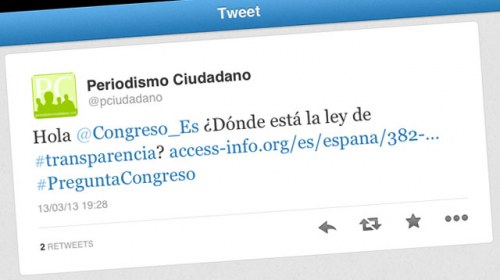Madrid, 20 May 2013 – Spain’s future Transparency Law remains stalled in the Parliament, which continues to invite selected experts to address the Constitutional Commission, although Access Info Europe has not yet been invited to present its criticisms of the draft. A summary of the latest interventions by experts such as Soledad Becerril, Àngels Barbarà, Borja Bergareche, Ignacio Escolar and Manuel Villoria, can be found here. There is also no news on Spain’s Open Government Partnership plans: the action plan presented to the OGP in April 2012 is still unavailable in Spanish on any government website, and there has been no further contact with civil society.In the meantime, the Government continues to be engulfed by corruption scandals and Prime Minister Rajoy has once again avoided taking questions from journalists by giving a second press conference from behind the safety of a plasma TV screen. Spain’s press associations have strong criticised this treatment. The latest news in the corruption scandals is that police have concluded that the leaked papers revealing a double accounting system in the ruling Partido Popular are not falsified, hence confirming the allegation that many senior figures in the party during Spain’s recent democratic history received large “salary” payments which were not declared to the tax authorities. At the same time, judges investigating the case have confirmed huge illegal donations from the heads of many of Spain’s largest companies, particularly the construction companies which benefitted from hundreds of millions in public procurement contracts during the construction boom which is one of the causes of the current crisis. In this context, the Spanish public has received news that unemployment has hit 27% with youth unemployment at 57%, and cuts continue to impact on essential services such as health and education. On Sunday, the second anniversary of the 15M (15 May 2011) protest movement, moving thousands of people gathered in the center of Madrid to protest against austerity policies. Access Info Europe continues to call for a stronger access to information law, reiterating the following points: » Law should recognise a fundamental right in line with international standards; » The scope of the law should apply to the legislative and judicial branches in their entirety, as well as to all private bodies performing public functions; » The law should apply to all information, and should not exclude access to “auxiliary or supporting Information such as the content of notes, drafts, opinions, summaries, and communications and internal reports shared within or between public bodies.” (Article 15); » There should be strong oversight: The proposed oversight body (the “Transparency Agency”) is dependent on the government and its powers are not specified in the draft law.

